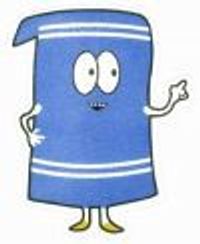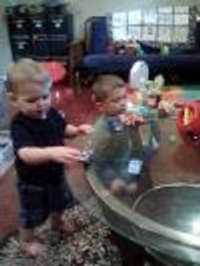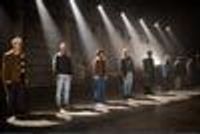Harry Potter Book Club - Chapter 16 A Very Frosty Christmas
#25re: Harry Potter Book Club - Starts Monday!
Posted: 2/19/06 at 6:06pm
Okay, I guess I'll do this.
Better go find my copy...
Bob Martin Online
hypertruffle
Broadway Legend Joined: 5/22/05
#26re: Harry Potter Book Club - Starts Monday!
Posted: 2/19/06 at 6:07pm
All I can say is this:
If I find myself typing up some crappy fanfic relating to Harry Potter, I have found my scapegoat.
#27re: Harry Potter Book Club - Starts Monday!
Posted: 2/19/06 at 6:12pm
All I can say is this:
If I find myself reading the crappy Harry Potter fanfic you've written, I will kill you. And then hang myself.
(Unless it focuses on the homoerotic tension between Snape and Sirius, and you provide some Photoshopped visuals.)
"Good luck returning my ass!" - Wilhemina Slater
"This is my breakfast, lunch and f***ing dinner right here. I'm not even f***in' joking." - Colin Farrell
#28re: Harry Potter Book Club - Starts Monday!
Posted: 2/19/06 at 6:39pmI must warn everyone; I am the Harry Potter Mistress. I know everything. Be warned.
♥♥♥
anjilly
Stand-by Joined: 11/15/05
#29re: Harry Potter Book Club - Starts Monday!
Posted: 2/19/06 at 6:57pm
I must warn everyone; I am the Harry Potter Mistress. I know everything. Be warned.
Well, OTM, that's the joy of these kinds of discussions: it's not just knowing the facts of what happened, it's talking meaning (overt and implied)and foreshadowing, and predicting what's to come. And there's the fun! ![]()
Can't wait to hear everyone's thoughts!
#30re: Harry Potter Book Club - Starts Monday!
Posted: 2/19/06 at 7:29pmYep. I'm so excited!
♥♥♥
#31re: Harry Potter Book Club - Starts Monday!
Posted: 2/20/06 at 8:08am
Chapter 1 The Other Minister
Cornelius Fudge visits the Prime Minister to tell him that several events that have happened over the past week were caused by Voldemort and his death eaters. Fudge has visited on other occasions to announce other significant events in the Wizarding world. This evening Fudge explains that he has been fired and introduces the Prime Minister to Rufus Scrimgeour the new Minister of Magic. Scrimgeour tells the Prime Minster about the security measures that have been put into place to ensure that he stays safe, including placing Kingsley Shacklebolt as the Prime Minister’s secretary and removing a junior minister who appears to have been placed under the Imperius Curse to St. Mungo’s.
*Questions for Discussion*
This is the first chapter in the entire series that describes events completely unknown to Harry. What do you think is the significance of having a narrator other than Harry?
We learn in this chapter that events in the Wizarding world have had a profound effect on the Muggle world. The series has indicated in the past that this sort of influence is not new (Grindlewald, the first reign of Voldemort). What do you think is the significance of the domination of the Wizarding world over the Muggle world? Should the Wizarding world have this kind of influence, especially with their insistence on keeping the worlds separate? How does all of this relate to Dumbledore’s ideals of communication and equality?
Had Fudge accepted the reality of Voldemort’s return earlier do you think he would still be Minister of Magic?
When the Prime Minister sees Rufus Scrimgeour he thinks that he can understand why the Wizarding community would prefer to have him in charge in these dangerous times. Do you think that the instinct to put their faith in a tougher leader to protect them from danger is a good one for the Wizarding world?
What is so important about this chapter that JKR sat on it for the first five books before finally using it (per interviews)?
*Just a reminder* You may reference anything that happens in any of the previous books, but nothing that occurs after Chapter 1 in HBP.
Thank you to Anjilly and Smartpenguin78 for their help with the discussion questions.
Updated On: 2/20/06 at 08:08 AM
#32re: Harry Potter Book Club - Starts Monday!
Posted: 2/20/06 at 8:26am
I think that if Fudge had accepted the return of Voldemort sooner then he would still be minister of magic. He got kicked out of offic because he didn't do his job and portect and warn the wizarding community soon enough. He let his jealously of Albus get in the way. He could never get Harry to help him look good so he made Harry out to be crazy. I think that he had a large hand in the way that Rita Skitter behaved during the Goblet of Fire. It just played in to his hands too well.
I think that JK held on to this one for so long because it says a lot that the muggle government knows about the wizarding community. Also it is a bit discomforting to know that the Prime Minister is so scared and seemingly under the control of the Minister of magic. This could mean a lot of trouble for the muggle world if Voldemort comes to power or if he is able to control the new MoM.
#33re: Harry Potter Book Club - Starts Monday!
Posted: 2/20/06 at 11:25am
I am not so sure that Fudge would have remained the Minister of Magic had he accepted Dumbledore's news that Lord Voldemort returned earlier.
To me, it has always seemed that Fudge has been paranoid of losing his position of Minister of Magic to Dumbledore despite there being no indication that Dumbledore actually wanted the position. I think there is a real possibility that Fudge would reveal the information to the wizarding community without having tangible evidence and the people would have called for a new minister (their preference would likely be Dumbledore) in an attempt to remove the minister who "allowed Voldemort to return" so to speak.
In terms of the writing, I never got the impression that Fudge was really going to play a primary role when Voldemort returned. He seemed to naive to really be an effective Minister of Magic in a time of crisis.
When the Prime Minister sees Rufus Scrimgeour he thinks that he can understand why the Wizarding community would prefer to have him in charge in these dangerous times. Do you think that the instinct to put their faith in a tougher leader to protect them from danger is a good one for the Wizarding world?
Assuming that the Muggle world in the Harry Potter universe is having the same type of world issues that we are dealing with currently (and I like to think that is the case) then yes. Not that I mean to say that they absolutely need a "heavy-handed" person in charge during war times, but I do think that the no-nonsense, take charge mentality that Rufus Scrimgeour displayed in the first chapter is a welcome change to Fudge's weaker, almost irrelevant Minister of Magic. Scrimgeour certainly seems that he is better prepared to make good, quick decisions under pressure than Fudge ever was in earlier books.
I am not sure that the issue is so much that Scrimgeour is "tougher" as much as his appearance seems more regal and confident and that is a welcome change to the wizarding community from the plump, timid appearance of Fudge.
I think KelRel makes a good point her regarding why Jo Rowling would have withheld this chapter for so long. The knowledge that the Muggle Government is not only aware of the Wizarding community, but is actually briefed on the goings on regarding Lord Voldemort opens up the feeling of potential "peril" here. For the first time, it really specifically includes us (assuming that we are all Muggles) as someone who is no longer reading about a far away world, but we are now in danger as well.
I am not sure how much of this theory that I believe myself, but I do think that it's possible Jo Rowling has been sitting on this chapter as it's a bit close to home regarding real world events. The concept of a "foreign, terrible evil" is certainly something that we hear about on our evening news and I think Rowling may have wanted to either spare us from that or hold out for as long as possible in an attempt to not appear to be creating a social commentary on the state of the world rather than just continuing with her very popular series.
ETA: One interesting thing that I question is the importance of the name Rufus Scrimgeour. Being a theatre person, my mind immeadiately went to the root "scrim". I did some research and came across Mugglenet.com's similar thought where they say:
"A "scrim" is a curtain that when lit from the front, nothing can be seen behind the curtain. When the curtain is lit from behind, anything behind the curtain can be seen. Is the good Minister hiding something?"
This was the same thought process I had, but the good people at Mugglenet really put it into words nicely for me.
I think it's important to mention that currently, Scrimgeour is in the spotlight. He's just assumed the position of Minister of Magic and all eyes of the Wizarding Community are on him. The spotlight is in front of him so to speak. If there is any substance to the "scrim" theory, it could stand to reason that we'll learn more about Scrimgeour from someone who is currently behind him.
One other question that I think we should raise is whether or not there is any relevance to the Prime Minister's political opponent? Since Jo Rowling waited for so long to use the chapter that reveals there are crossovers between the Wizarding and Muggle world is it possible that the Prime Minister's political adversary is involved with Voldemort. Here is the passage that struck me:
"A grim mood has gripped the country," the opponent had concluded, barely concealing his own broad grin.
Is this mystery opponent potentially linked to the devastation? Could Voldemort allow himself to become allies with a Muggle? Is it possible that a wizard is posing as a Muggle to overthrow the Prime Minister? Is it just exposition to stress that the muggle world is also being impact by the return of Voldemort?
Updated On: 2/20/06 at 11:25 AM
#34re: Harry Potter Book Club - Starts Monday!
Posted: 2/20/06 at 11:53am
"Questions for Discussion*
This is the first chapter in the entire series that describes events completely unknown to Harry. What do you think is the significance of having a narrator other than Harry?
**We've always had a narrator other than Harry. That is part of the wonder of these books, discovering this whole world that existed and Harry knew nothing about. To have only Harry's views on the whole thing would be very limiting. Also, having an external narrator points out how Harry is only part of what's going on...Voldemort's return will impact more than just Harry.
We learn in this chapter that events in the Wizarding world have had a profound effect on the Muggle world. The series has indicated in the past that this sort of influence is not new (Grindlewald, the first reign of Voldemort). What do you think is the significance of the domination of the Wizarding world over the Muggle world? Should the Wizarding world have this kind of influence, especially with their insistence on keeping the worlds separate? How does all of this relate to Dumbledore’s ideals of communication and equality?
****I don't see the wizarding world as having "domination" I saw it as letting the Muggle world know there was a situation in the Wizarding world that could potentially impact them.
Had Fudge accepted the reality of Voldemort’s return earlier do you think he would still be Minister of Magic?
***I never saw Fudge as secure in the Minister of Magic position...and I don't think HE felt secure in the Minister of Magic position.
When the Prime Minister sees Rufus Scrimgeour he thinks that he can understand why the Wizarding community would prefer to have him in charge in these dangerous times. Do you think that the instinct to put their faith in a tougher leader to protect them from danger is a good one for the Wizarding world?
***When you are heading into a war, you don't want someone wimpy and wishy-washy as your leader. You want someone with convictions...rather they be right or wrong...your leader needs to be secure in his/her ideas to be a good leader. Obviously, Fudge was not that person.
What is so important about this chapter that JKR sat on it for the first five books before finally using it (per interviews)?
***There was no 'need to know' about communication between the two worlds. I think JKR is the queen of not telling us more than we need to know to understand the story at that time. Plus, she has slowly been widing the circle of Harry's world...first Hogwarts, then the Weasley's and the visit to the Quiddich cup, then Sirus and his father's other friends, now we are seeing a "nation wide" wizarding group.
#35re: Harry Potter Book Club - Starts Monday!
Posted: 2/20/06 at 12:03pm
This is the first chapter in the entire series that describes events completely unknown to Harry. What do you think is the significance of having a narrator other than Harry?
Not to be picky, but Harry is never technically the narrator, although nearly the entire series is third-person limited focusing on his perspective (the exceptions up until now being chapter one of Sorcerer's Stone where Harry is a baby and the first chapter of Goblet of Fire, which is from the perspective of the Riddles' gardener, but even then Harry dreams about the events). So, this is the first point in the series that we see events of which Harry is completely unaware. As to the significance of this, I think that Rowling wanted to widen the scope of the series and remind us that it isn't just Harry or even just the Wizarding World that needs to fear Voldemort's return to power--it's everyone. Throughout the series, Wizarding crimes that have involved innocent Muggles have been regarded as some of the most deplorable (recall how awful it was that Sirius Black had supposedly killed a group of Muggles in his confrontation with Peter Pettigrew), probably because it's acknowledged that they can't defend themselves against magical attacks. I think that including the scene between the two Ministers is an attempt to show the connection between the two worlds and emphasize that both are endangered by Voldemort's return. This is, as was pointed out in the discussion prompts, something that has been done before in regards to Grindelwald/WWII and Voldemort's first reign. Really terrible events in the Wizarding world seem to carry over to the Muggle world.
What do you think is the significance of the domination of the Wizarding world over the Muggle world? Should the Wizarding world have this kind of influence, especially with their insistence on keeping the worlds separate? How does all of this relate to Dumbledore’s ideals of communication and equality?
This is quite an interesting series of questions. Honestly, I didn't get that much of a sense of the Wizarding world's domination over the Muggle world from this chapter. There could be complete domination, but most wizards seem content to let Muggles be (even though they probably feel superior). Fudge does burst in and dominate the Prime Minister in order to be able to speak with him, but that seems more of a necessary evil than the Minister of Magic asserting his superiority over the Prime Minister. Events must get related, so clearly the PM will be very confused. I don't think that there's any other way to handle a chapter such as this than having the Prime Minister submit to whatever plans the MoM has put in place. The PM is clearly frazzled but competent and doesn't seem to be a pushover. I don't find this chapter to be making a great deal of commentary on Wizard/Muggle relations other than (I think) to suggest that the Wizarding world could be completely dominant over the Muggle world if it so desired. The Wizarding world, except when there's an emergency of some sort, lets the Muggle government run itself seemingly without interference. That gives all the more to be feared if someone like Voldemort who is willing to use magic to enslave Muggles returns to power.
As to how all of this relates to Dumbledore's ideals of equality. Muggles, though seen as quite unfortunate because they don't have magical powers, are regarded as still having basic human rights. It is a crime in the Wizarding world to harass or harm them (although a more cynical perspective might think that this is so that the Muggles remain unaware of the Wizarding world). This is in contrast to some of the other intelligent magical creatures or half-humans, who are seen as animals. So, "human-ness" seems to be an even more important factor than magical ability in how an individual is regarded.
What is so important about this chapter that JKR sat on it for the first five books before finally using it (per interviews)?
I don't think that her having sat on this chapter since book one has so much to do with its being of higher impoertance, I just think that she wanted to write it and here it finally fit. It does, for reasons that I've discussed already, do a very nice job of reminding readers of the monumental importance of Voldemort's return to power.
Updated On: 2/20/06 at 12:03 PM
#36re: Harry Potter Book Club - Starts Monday!
Posted: 2/20/06 at 12:04pm
I can't wait until I get home tonight and can contribute to this thread! I'm loving it already ![]()
"Shut up! It's been 29 years!!!" --the incomparable Patti LuPone in her MUCH DESERVED Tony acceptance speech for Gypsy.
Kitzy's Avatar du Jour: Kitzy as Little Red Ridinghood in her college's production of "Into the Woods"
#37re: Harry Potter Book Club - Starts Monday!
Posted: 2/20/06 at 12:24pm
Patronus wrote:
One other question that I think we should raise is whether or not there is any relevance to the Prime Minister's political opponent? Since Jo Rowling waited for so long to use the chapter that reveals there are crossovers between the Wizarding and Muggle world is it possible that the Prime Minister's political adversary is involved with Voldemort. Here is the passage that struck me:
"A grim mood has gripped the country," the opponent had concluded, barely concealing his own broad grin.
Is this mystery opponent potentially linked to the devastation?
This hadn't occurred to me, although it doesn't seem that likely to me. Voldemort has plenty of ways to infiltrate the Muggle government other than being somehow conencted to the Prime Minister's opponent (Imperius curse, other magical means). I honestly think that it was just a little slam at politics and how awful things that happen under a political opponent's charge are a goldmine in an election. Of course the opponent is going to be gleeful that the Prime Minister seems to be floundering and he gets to rub it in.
It was actually suggested that there were occasional crossovers between the two worlds once before, in Prisoner of Azkaban, when the Muggle authorities were alerted about Sirius Black.
#38re: Harry Potter Book Club - Starts Monday!
Posted: 2/20/06 at 12:32pm
I don't have my book with me at the moment, so I can't add a lot to the discussion questions yet, however, I wanted to share my initial thoughts when I started reading this book.
I thought it was interesting that it's completly evident that JKR hasn't have every little plot point figured out since the beginning. There are so many little things that point to the US and the terrorism wars and things going on around the world. I was amused by the quote (something like) "waiting for the president of that land across the ocean to call."
More later when I can be more literary-themed with my book sitting next to me. Thanks for everyone's input so far - this is so much more fun than doing it for class. :)
anjilly
Stand-by Joined: 11/15/05
#39re: Chapter One: The Other Minister
Posted: 2/20/06 at 12:43pm
What do you think is the significance of having a narrator other than Harry?
As Siren and Wendy said, it’s key it showing us the scope of the Lord Thingy problem. We saw it a bit in GoF, too- the happenings caused by the DEs and LV are no longer personal to Harry- it’s expanding to the rest of the world. Though we’ve had mention of outside mischief caused by the DEs, it’s mostly been in a historical context, such as when Moody was showing Harry the photo of the Order members that were killed by LV and crew. This chapter illuminates the fact that rise of LV is not only current and very real, it’s a large-scale problem. It also reminds me of the Sorting Hat song- the one from OotP- when the hat warned that everyone must unite in troubled times. Perhaps we will see more Muggle- Wizard cooperation in the future?
What do you think is the significance of the domination of the Wizarding world over the Muggle world? Should the Wizarding world have this kind of influence, especially with their insistence on keeping the worlds separate? How does all of this relate to Dumbledore’s ideals of communication and equality?
I don’t know that the Wizarding world dominates the Muggle world- but based on Fudge’s demeanor, they certainly think they are superior. Scrimgeour certainly was very condescending to the Muggle PM- left no possibility for a partnership. However, Wizards interfering in British Muggle politics is certainly nothing new- Merlin did it all the time ![]()
Dumbledore always does give everyone the benefit of the doubt- if he were in Fudges/ Scrimgeour’s shoes, I do think he would have had more of a dialogue with the Muggle PM rather than delivering a missive from on high. Of course, if Dumbledore were in the MoM role, they wouldn’t be in the situation in the first place, so moot point.
It’s interesting that the reason for Wizards going into hiding (Muggles expecting magical solutions to all problems) was validated in this chapter.
Had Fudge accepted the reality of Voldemort’s return earlier do you think he would still be Minister of Magic?
I don’t think he would be. Fudge didn’t deny Voldemort’s return for political purposes, per se- it was more that his ego wouldn’t allow him to believe that a danger so large and insurmountable could return on his watch. He isn’t equipped to deal with such adversity, so he instead saw the news of LV’s return as an attack on him personally. If he was a different person altogether, who could have risen above his insecurities to admit the danger- well, he would have bollixed up the effort anyhow and been ousted.
Do you think that the instinct to put their faith in a tougher leader to protect them from danger is a good one for the Wizarding world?
Depends on whose side the toughness resides upon and where that person’s loyalties actually lie ![]() Seriously, tough is good, but what we have to remember is that LV isn’t tough per se- he is smart. Dangerously smart. And so the Wizarding world needs a match for that cleverness almost more than they need tough.
Seriously, tough is good, but what we have to remember is that LV isn’t tough per se- he is smart. Dangerously smart. And so the Wizarding world needs a match for that cleverness almost more than they need tough.
What is so important about this chapter that JKR sat on it for the first five books before finally using it (per interviews)?
In addition to what has been said already, if she would have used it sooner she could not have continued with the illusion that Fudge was wholly unaffected by the events he had been denying.
theatrebabe
Broadway Legend Joined: 8/22/05
#40re: Harry Potter Book Club - Starts Monday!
Posted: 2/20/06 at 12:47pm
I have always loved the first chapter of this book. The way JKR recaps everything while making it part of the plot is amazing.
Patronus, I really like all those theories. The one about the scrim. And the one about Voldemort being in league with the muggles. Seems very possible to me.
-cheezedoodle
anjilly
Stand-by Joined: 11/15/05
#41re: Harry Potter Book Club - Starts Monday!
Posted: 2/20/06 at 12:59pm
Lupin asks Bill if he's had any luck with Scrimgeour yet. Bil says no, he's still feeling pretty anti-wizard at the moment.
That is a coincidence, right?
Wouldn't it be interesting (given prior prejudices) if the Wizarding world inadvertently elected a "part-human" to MoM?
#42re: Harry Potter Book Club - Starts Monday!
Posted: 2/20/06 at 1:03pm
theatrebabe, is there any way that you can reference a page number for that? It's just easier to be able to comment on it if I can go back and read it. ![]()
#43re: Harry Potter Book Club - Starts Monday!
Posted: 2/20/06 at 1:08pm
We should be cautious not to get ahead of the discussion here though. The guidelines are that we can talk about previous books, but not things that happen later on this Half Blood Prince.
It's possible that people are reading the book for first time and rather than potentially spoil something it might be best to wait until we come up to that part in the book.
/end evil librarian rant.
theatrebabe
Broadway Legend Joined: 8/22/05
#44re: Harry Potter Book Club - Starts Monday!
Posted: 2/20/06 at 1:09pmOh, dammit. The say Ragnok, not Scimgeour. Sorry! I've only actually read the book all the way through once. I listen to the books on tape constantly though(Yeah, I'm a dork). The details get mixed up in your head.
-cheezedoodle
#45re: Harry Potter Book Club - Starts Monday!
Posted: 2/20/06 at 1:16pm
theatrebabe, you are not entirely incorrect. Scrimgeour is mentioned in that chapter, but it has something to do with the Aurors saying that Scrimgeour seems suspicious. It makes perfect sense as he was Head of the Auror Office at the time and JKR likes to through out these names that will be important later.
I'd give a page, but my book is at home and I am at work. I'll try to do it later if no one else has before I get home.
I just want to say that the discussion has been very interesting to read and I'm looking forward to getting home from work and having time to really comment.
Also Patronus I'm totally offended by your Librarian remark. Stop the stereotyping! ![]()
anjilly
Stand-by Joined: 11/15/05
#46re: Harry Potter Book Club - Starts Monday!
Posted: 2/20/06 at 1:21pm
The only mention of Scrimgeour in OotP is in chapter 7- The Ministry of Magic:
Lupin glanced at Harry, then said to Tonks, "What were you saying about Scrimgeour?"
"Oh... yeah... well, we need to be a bit more careful, he's been asking Kingsley and me funny questions..."
What that says to me is that he is definitely not trusted by Dumbledore, and throws into question just who he is loyal to.
ETA- YM, you're right that it makes sense that he is suspicious due to his position, but he either believes Fudge that LV isn't back yet, and is helping the ministry loyally- and is royally stupid- or he has his own agenda in being suspicious of those who may be in allegiance with Dumbledore.
#47re: Harry Potter Book Club - Starts Monday!
Posted: 2/20/06 at 1:22pmThank you Anjilly, that's the passage I was thinking of.
#48re: Harry Potter Book Club - Starts Monday!
Posted: 2/20/06 at 1:27pm
Also Patronus I'm totally offended by your Librarian remark. Stop the stereotyping!
I'll take it back ONLY if you can honestly say that you wouldn't have come in here and said the same thing. ![]()
#49re: Harry Potter Book Club - Starts Monday!
Posted: 2/20/06 at 2:03pm
The discussion seems to be going really well, and I have comments on what everyone said, but no time right now. I will just take a bit of time with this.
What do you think is the significance of having a narrator other than Harry?
singingwendy, sweetsiren, and anjilly touched on this.
The book is from the perspective of Harry, and the reader is not allowed to know things that Harry does not realize most of the time, we get to know what Harry thinks, but no one else. Therefore the narrator is 3rd Person limited, with Harry's vision, most of the time. The break from this in GoF was only a percieved break since it turned out he was dreaming the first chapter.
In this case, I think there are several reasons the change to narrator without bounds are important. First, we need to see the world does not run from Harry's point of views as has been decribed, this is not just his story but everyone in the world's.
I will take this farther when we reach the next chapter, I think the REAL importance of this new perspective lies there. ![]()
Videos









